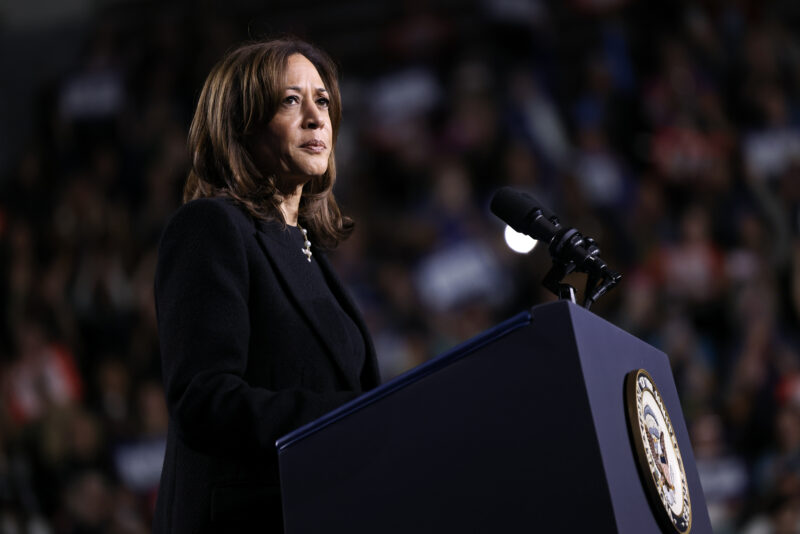What might come next for Israel — and the U.S. — in wake of Iranian attack
Middle East security experts assess Israel’s likely response to the Iranian missile attack and what role the U.S. might play

(Photo by Saeed Qaq/Anadolu via Getty Images)
HERZLIYA, ISRAEL - OCTOBER 01: A view of a giant hole as Israeli forces arrive in the area and investigate debris of missiles fired from Iran towards Israel, after they fall in Herzliya, north of Tel Aviv, Israel on October 01, 2024. The Israeli military reported that missiles were launched from Iran towards Israel, triggering sirens throughout the country, particularly in Tel Aviv.
After Iran rained ballistic missiles on Israel on Tuesday for the second time in sixth months, the focus now turns to the question of what comes next: how Israel will respond, and what role Washington will play in supporting — or tempering — Israel’s actions.
Several Middle East security experts told Jewish Insider that Israel has an obligation to respond forcefully, and that the U.S. should support Israel’s actions countering Iran. The U.S. military coordinated closely with the Israel Defense Forces on joint missile defense against the Iranian attack, and senior Biden administration officials said on Tuesday afternoon that Washington will stand by Israel in the aftermath.
“We are proud of the actions that we’ve taken alongside Israel to protect and defend Israel,” U.S. National Security Advisor Jake Sullivan said on Tuesday afternoon. “We have made clear that there will be consequences, severe consequences, for this attack, and we will work with Israel to make that the case.”
In recent days, the Biden administration has put forth a message calling for de-escalation in the region, even while expressing support for Israel’s right to defend itself. By Tuesday afternoon, that message had shifted.
“While there will undoubtedly be a desire to prevent an escalatory cycle that leads to a wider regional war, the U.S. should be coordinating with Israel to figure out how Israel can respond in a robust and non-symbolic way that still provides Iran with a plausible ladder it can climb down,” said Michael Koplow, chief policy officer at the center-left Israel Policy Forum.
Koplow urged the U.S. to stand behind Israel, but argued against American troops or military assets being physically involved in the response.
“The U.S. should be publicly clear that it is coordinating with Israel and that it shares Israel’s view that Iran’s attack needs a response, but it shouldn’t be U.S. planes dropping anything on Iran,” said Koplow.
Jason Brodsky, policy director at the more hawkish United Against Nuclear Iran, said the U.S. should team up with Israel in targeting Iran directly.
“I believe Israel must retaliate directly against Iran. And strikes on the nuclear program must be on the table,” said Brodsky. “With thousands of Americans living in Israel, the U.S. should join Israel in striking Iranian nuclear sites.”
Danielle Pletka, a senior fellow at the American Enterprise Institute, said Israel should respond in a way that does not prompt a further Iranian response. “As in April, the Israeli government was wise to hit Iran in a way that demonstrated its capabilities, but did not do so much damage that Iran felt the need to continue to respond,” she told JI.
Conservative analysts criticized President Joe Biden for his response to Iran’s attack against Israel in April, when he reportedly told Israeli Prime Minister Benjamin Netanyahu to “take the win” and not mount a counterattack.
“The last time Israel confronted a direct attack from Iran in April, the Biden-Harris administration urged restraint, advising Israel not to retaliate. The Israeli war cabinet need not heed their advice,” said Morgan Ortagus, a former Trump administration State Department spokesperson and the founder of Polaris National Security.
With two direct Iranian attacks on Israel in a matter of months, Washington Institute for Near East Policy’s executive director, Robert Satloff, said Israel “cannot allow the idea to take hold that such missile attacks are normal, acceptable, legitimate behavior, and imposing a cost on Iran is an important way to prevent that.”
With Hezbollah in “disarray,” Satloff added, “the attraction to Israel of a significant retaliation against Iran — perhaps even against elements of its nuclear program — is likely to become too powerful to resist.”
Jonathan Lord, a former Department of Defense official, said the U.S. should be thinking about how to show Iran that launching missiles at Israel — even when, as was the case Tuesday, they did not kill any Israelis — is unacceptable.
“The consideration for the U.S. is, how do we introduce more risk to the [Iranian] regime in advance of that launch, such that the risk of that launch becomes too high a cost to the appearance of the regime’s security?” asked Lord, director of Middle East Security at Center for a New American Security.



















































